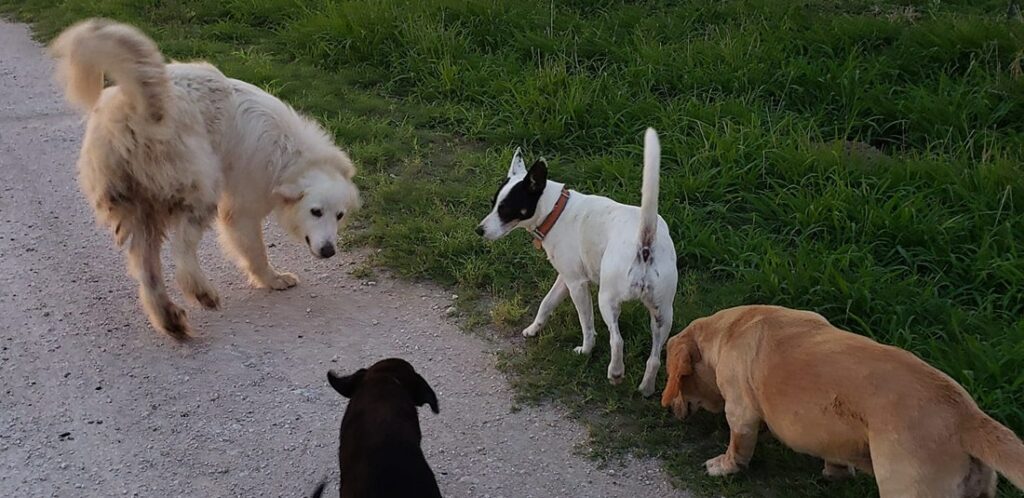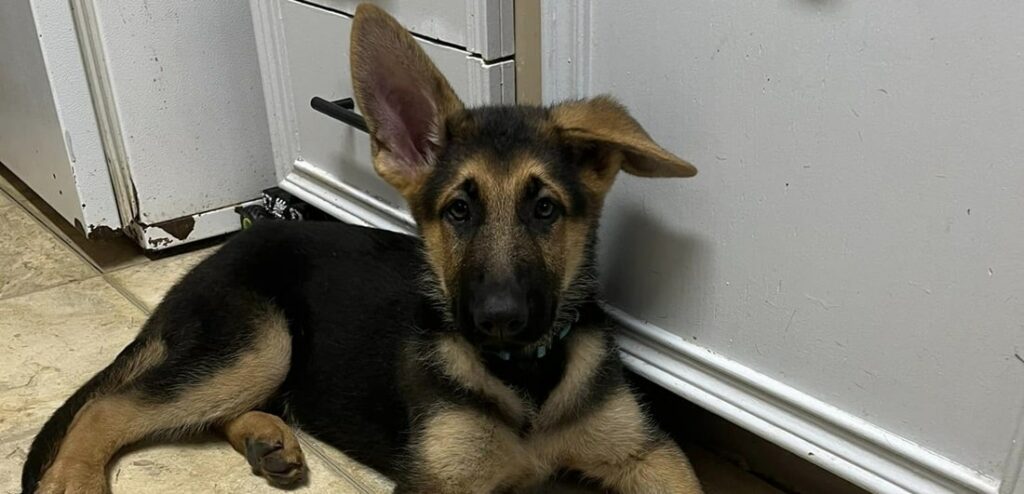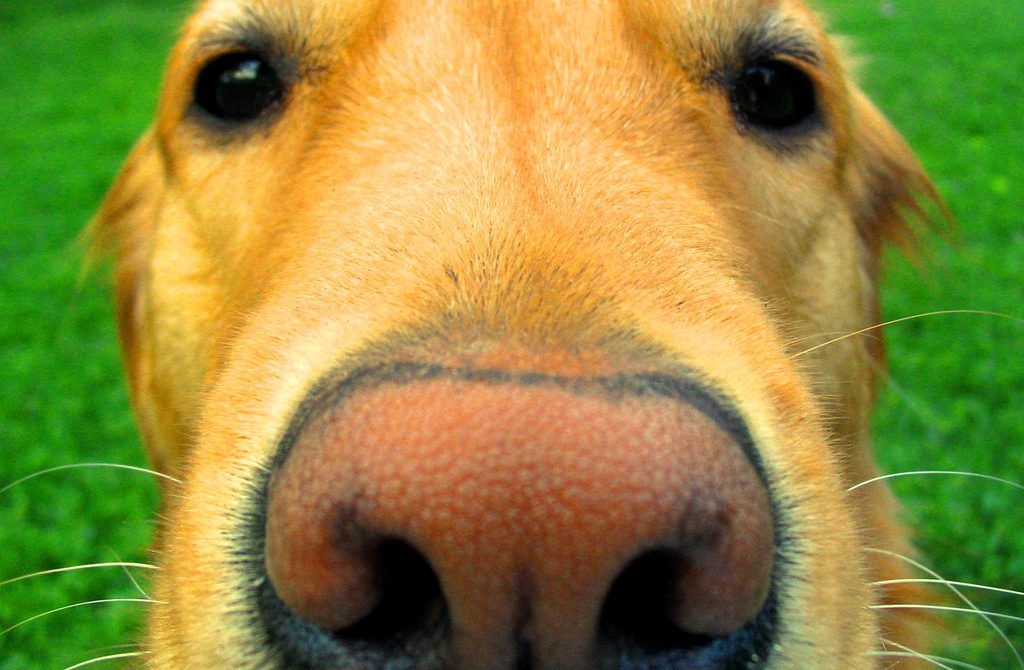Dogs have an incredible sense of smell that they can even sense illness in other dogs and humans.
Many pet parents are wondering if their dog is trying to tell them something because they have been sniffing them a lot lately.
In this blog post, I will be talking about how powerful the dog nose is and how they react when they sense illness.
Key Takeaway
- Dogs can sense illness in another dog due to their highly developed sense of smell which allows them to pick up on subtle changes in another animal’s scent that may indicate an illness.
- Dogs, with their extraordinary sense of smell, can potentially detect a range of illnesses in other dogs such as cancer, diabetes, malaria, Parkinson’s disease, and various bacterial infections.
- When dogs smell illness, their behavior can vary, but common signs include excessive licking, focusing or sniffing on one part of the body, random whimpering or crying, acting clingy, and staying close to the person or animal they perceive as unwell.
- When dogs detect illness, they are likely picking up on the unique chemical compounds or volatile organic compounds (VOCs) produced by diseases such as cancer, diabetes, and Parkinson’s disease, which alter the normal scent of an individual or other animals.
Can My Dog Sense Illness In Another Dog?

Yes. Dogs can sense illness in another dog due to their ability to pick up on subtle changes in another animal’s scent that suggest an illness.
Dogs have hundreds of millions of olfactory receptors in their noses compared to only a few million for humans, giving them an incredible capability for detecting odors.
Every dog has a powerful nose that is used to detect smells. Dogs have up to 300 million olfactory receptors in their noses compared to humans who have only 6 million.
This makes them super sensitive to smells and able to discern even the slightest odors. In fact, the canine’s sense of smell is so acute that they can recognize different people by their scent even when they are invisible or a long way away.
An interesting phenomenon is how dogs’ scents can change when they become sick. A dog’s body chemistry can drastically alter when it’s ill, and this translates into their skin, fur, saliva, or breath smelling different from when they are healthy.
When other dogs are exhibiting signs of illness, such as changes in breathing, body temperature, and heart rate, their unique scent will change as well.
Dogs with trained noses can reportedly discern these subtle changes, giving them the ability to predict when sickness is present in other canines before any outward signs are noticeable.
This adaptive awareness can be extremely helpful for pet owners to detect an impending sickness in their dogs quickly.
What Illnesses Can Dogs Detect In Other Dogs?

Dogs, with their extraordinary sense of smell, can potentially detect a range of illnesses in other dogs, including infections, changes in blood sugar levels, and even some types of cancer.
Infections
Dogs are often able to pick up on the scent of infections in other dogs. This is due to the presence of different bacteria or yeasts which can change the smell of an affected dog.
I recall a case where a dog persistently avoided its companion who, upon examination, was found to have a severe ear infection. Once treated, the dogs resumed their normal interactions, suggesting that the healthy dog had detected the infection.
Changes in Blood Sugar Levels
Just as dogs can be trained to alert humans to low blood sugar levels, they can also detect these changes in other dogs.
In my practice, I’ve seen instances where diabetic dogs were closely monitored by their canine companions, who would become noticeably anxious when the diabetic dog’s blood sugar dropped.
Cancer
While more research is needed in this area, there have been cases where dogs appeared to detect cancer in other dogs.
They may show unusual interest in a particular area of the other dog’s body, often the same area where a tumor is later discovered.
One memorable case involved a dog who kept sniffing a specific spot on his canine companion. Upon veterinary examination, a small tumor was found at that exact location.
How Do Dogs Act When They Smell Illness?

Dogs react to changes in the smell of their owners’ breath and body odor in various ways such as barking, cowering, or becoming agitated.
In some cases, they even follow their instincts and lick or sniff certain affected areas on their owner’s body.
Dogs have an amazing ability to sense when something is wrong with their human companions. Certain studies have shown that dogs are capable of detecting odors that hint at illness in humans, and often alert humans before other signs of illness appear.
Dogs are highly intelligent and intuitive creatures, capable of detecting potential illnesses in their owners with amazing accuracy. Whether the illness is physical or mental, dogs know when something is not quite right.
They may show physical signs of distress, such as restlessness or panting more than usual, or offer additional affection and companionship to their owners.
Sometimes they even display warning behaviors such as alerting the owner when it’s time to take medication or providing tugging guidance to encourage a walk outdoors.
Can Dogs Sense Serious Illness?

Through their heightened sense of smell, dogs can detect the presence of disease markers that are undetectable by humans, even detecting changes in individual body chemistry that signify something is off.
It’s a common belief that dogs have an uncanny ability to recognize when something is wrong with us, even if we can’t put our finger on it.
From detecting changes in routine to sensing biological markers, there is mounting evidence that suggests dogs might be able to sense serious illnesses in humans like cancer and diabetes.
From the overpowering smell of a bacterial infection to the frustratingly pungent aroma of a common cold, there is no doubt that certain illnesses have their own distinct smells.
In fact, this phenomenon is so well-known, it even has its own name: Osmophobia. Osmophobia is caused by chemicals and molecules released into the air from infected cells in your body, which have a unique scent.
For example, some professional assistance dogs are so skilled at recognizing these signs that they can detect early stages of cancer and alert their owners before any physical symptoms become present.
Research into this phenomenon has found that dogs pick up on subtle electrical patterns through their noses when they smell a scentless molecule produced by the tumor in question. This clearly demonstrates just how powerful a dog’s sensory abilities can be!
What Dogs Smell When They Detect Illness
When dogs detect illness, they are essentially smelling the chemical changes in the body caused by the disease.
Dogs have an incredibly sensitive olfactory system, which allows them to pick up scents that humans cannot. When a dog detects illness, whether in humans or other dogs, it senses the volatile organic compounds (VOCs) that diseases produce.
These VOCs cause changes in a person’s or animal’s normal scent profile, and dogs can pick up on these changes due to their superior sense of smell.
In my years as a veterinarian, I’ve seen this remarkable ability in action. Dogs have been known to act differently around owners or other dogs who are unwell, often because they can smell diseases like cancer, diabetes, and even migraines.
For instance, I recall a case where a dog persistently sniffed at a particular spot on its owner’s leg. The owner later found out that he had skin cancer in that exact spot.
How Do Dogs Act When They Smell Cancer?

Dogs are able to detect a serious disease because cancer produces volatile organic compounds, or VOCs, in some cases which are released through urine, breath, and sweat. When dogs smell cancer, they will constantly sniff one area of their owner’s body and bark.
Scientists and researchers are constantly looking for new ways to accurately detect the onset of cancer in humans. What many may not realize is that dogs can also be trained to help with early detection.
Several studies have shown that dogs with their highly evolved sense of smell are able to smell certain chemical compounds associated with cancer, prompting them to alert medical professionals accordingly.
Dogs have an incredibly powerful sense of smell, so it’s no surprise that they are able to detect cancer in patients. Scientists have hypothesized that dogs are able to sense minute chemical changes in the breath or urine of those with cancer.
Recently, scientists conducted studies using breath samples from patients with lung cancer and healthy volunteers to confirm this hypothesis. What they discovered was that these canine partners were over 99% accurate in identifying which samples belonged to those with cancer and which did not.
Dogs have an incredibly powerful sense of smell, and research has revealed that they can pick up on specific smells in the bodies of those affected by cancer. They exhibit a change in behavior when sensing these odors, from a decrease in energy to sticking their nose repeatedly close to a certain area.
Case Studies: Instances of Dogs Detecting Illness In Other Dogs
Dogs detecting illness in other dogs is a phenomenon that has been observed in numerous instances, backed by their keen sense of smell which allows them to pick up on subtle changes in another dog’s scent indicating an illness.
In my time as a vet, I’ve come across several cases where dogs have shown a heightened awareness of illness in their canine companions.
One case that particularly stands out involved two Labrador Retrievers who were inseparable. The older one had developed a tumor, and before we even confirmed it with tests, the younger one started showing signs of stress and would constantly sniff at the older dog’s affected area.
In another instance, a client brought in their German Shepherd because he was acting unusually aggressive towards his playmate, a Golden Retriever from the same household.
Upon examination, we discovered that the Golden Retriever had a severe infection that had gone unnoticed.
Once treatment started, the German Shepherd’s behavior returned to normal, suggesting that the aggression might have been an indication of the detected illness.
FAQs
Q: How do dogs communicate that they’ve sensed illness in another dog?
Dogs may exhibit behaviors like persistent sniffing, whining, or altered interaction with the dog they suspect is ill, indicating they’ve sensed something is off.
Is it common for dogs to be able to sense illness in their peers?
Many dogs have the innate ability to sense illness, but the clarity of these senses can vary from dog to dog.
Should I take my dog to the vet if they’re acting strangely around another dog, possibly sensing an illness?
If your dog’s behavior changes significantly or you suspect the other dog is indeed sick, it’s wise to consult with a veterinarian for both animals.
How accurate are dogs at sensing illness in other dogs?
While dogs have shown a remarkable ability to detect certain illnesses, accuracy can vary greatly among individual dogs and specific conditions.
Can I train my dog to be more adept at sensing illness in other dogs?
Specific training programs can enhance a dog’s ability to detect illness, but these are usually designed for professional working dogs, such as medical detection dogs.
Conclusion and final thoughts
In conclusion, dogs have a remarkable ability to sense when something is off with another dog’s health.
While the exact mechanism behind this is still unknown, it is clear that they are highly attuned to changes in body language, behavior, and scent.
This ability not only serves as a valuable tool for pet owners but also demonstrates the deep emotional bond and empathy that exists between dogs.




